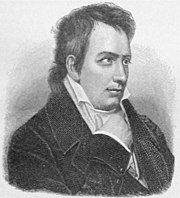Poet life
Dichterleben is the oldest historical novella by Ludwig Tieck , which - written in 1825 - was published by Brockhaus in Leipzig in the same year .
London-Southwark anno 1592/93: Shakespeare's star rises “while his predecessors are bowing to their graves”.
content
In London there are already a number of poets, playwrights and satirists whom the respected publicist Francis Meres can write and the "pedantic linguist" Florio can talk about. Meant are Thomas Nash , Thomas Lodge , George Peele , Edmund Spenser , Christopher Marlowe and Robert Greene . The novel is about the life and death of the last two.
In their literary endeavors, the two young men are concerned solely with their poetic fame. Otherwise, neither Marlowe nor Greene can handle money. Marlowe, "arrogant," thinks nothing of the institution of marriage. He neglects Fanny, his lover. Greene at least tried marriage. But he left the wife Emmy and their little son. Greene made the fortune with "ungodly Billy". The tide turns. Emmy goes to London with the child Greene, and to make matters worse, the poet is made materially comfortable by a patron. But Greene leaves his wife and child again. He squandered the money with the “noble lover” Billy outside of London. After Billy has run away with the remaining money, Greene returns to London penniless and sick. His health deteriorated rapidly after he learned from Marlowe what kind of poet the author of " Romeo and Juliet " is. Greene dies. Marlowe follows his friend into the grave when he raises the dagger against an unarmed rival and the attacked person unceremoniously turns the murder weapon over.
shape
A certain Shakespeare is only mentioned at the end of the novella. This, it turns out, is the writer of the two protagonists. The text is not primarily about Shakespeare. It's about: Marlowe and Greene believe in the immortality of their poetic work and have to understand that against “Romeo and Juliet” their own is “just bungling”.
Although the above Writers sometimes spread verbosely about literature in the novella, but Tieck still manages to paint a very colorful picture of London towards the end of the 16th century. Enter fortune tellers, sectarians and prophets. And the enterprising theater entrepreneur Philipp Henslow is shown how he would like to persuade the carefree, partying poets to continue writing what has been started (and with an advance payment). Henslow asks Marlowe insistently: "How about your Faust ?" To the chagrin of the questioner, the polite answer from the cheerfully drinking round is: "The muses are not willing at all times".
As is well known, Marlowe outlived his friend Greene by nine months. But Tieck lets Marlowe - probably for "dramaturgical" reasons - die a few days after the friend.
reception
- In the novella, Shakespeare passes “just in the background”.
- In the juxtaposition of Shakespeare and Marlowe, Tieck treats one of his great themes: “Poetry and Fatherland”.
- Poet's life , laid out as a trilogy, was "partially unsuccessful"
- The novella provides "no credible Shakespeare image"
- The poet's existence in an “unpoetic world” is the theme. Kern sees Shakespeare in this struggle for survival as the “central figure” in the novella.
trilogy
The third part is not available. Sources for the second part:
- The text at Zeno.org: Dichterleben. Part two .
- Ludwig Tieck's writings. Volume 18: Novellas Volume 2: The Kenelworth Festival; Dichterleben - Part I and Part II. G. Reimer Berlin 1844. 382 pages. Title stamp. Untrimmed and not cut open at the edges. Paper partly brown stained and dusty.
Information in Paulin, p. 91, 1st reference from above:
- Ludwig Tieck: poet life. Second part in a wreath of novellas . An almanac for the year 1831. 1st year Reimer Berlin. Pp. 1-206.
- Both parts were reprinted in Berlin (GDR) in 1981.
literature
- source
- Gotthold Ludwig Klee (ed.): Tiecks works. Third volume. Poet life. Pp. 107–216 in Meyer's classic editions. Bibliographisches Institut Leipzig and Vienna 1892. Critically reviewed and explained edition. 474 pages
- First edition
- Ludwig Tieck: poet life. First part in Urania. Paperback for 1826 . Brockhaus Leipzig 1825. pp. 1–139
- expenditure
- Ludwig Tieck: Poet's life (first part) . Zenodot Publishing Company. July 2007. 80 pages, ISBN 978-3-86640-216-4
- The text at Zeno.org: Dichterleben. First part
- Secondary literature
- Johannes P. Kern: Ludwig Tieck: poet of a crisis . Lothar Stiehm Verlag Heidelberg 1977. 243 pages. Volume XVIII of the Poetry and Science series
- Roger Paulin: Ludwig Tieck . JB Metzlersche Verlagsbuchhandlung Stuttgart 1987. Series: Metzler Collection; M 185, 133 pages, ISBN 3-476-10185-1
Web links
Individual evidence
- ↑ Source, p. 109, footnote 2 and Paulin, p. 90, 2nd Zvu
- ↑ Jakob Minor , quoted in Quelle, p. 112, 4th Zvu
- ↑ Source, p. 201, 17. Zvo
- ↑ Source, p. 203, 12. Zvo
- ↑ See footnote 1 in the source, p. 211
- ↑ Minor, quoted in the source, p. 110, 11. Zvu
- ↑ Paulin, p. 88 below
- ^ Paulin, p. 101, 5th Zvu
- ^ Paulin, p. 102, 4. Zvo
- ↑ Kern, p. 184, 3rd paragraph
